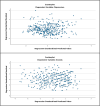The power of emotion regulation: how managing sadness influences depression and anxiety?
- PMID: 39810249
- PMCID: PMC11731166
- DOI: 10.1186/s40359-025-02354-3
The power of emotion regulation: how managing sadness influences depression and anxiety?
Abstract
Background: Emotions are a fundamental part of life and play a critical role in shaping individuals' experiences Effectively regulating emotions in socially appropriate ways is essential for navigating life successfully. This study investigated the impact of seven sadness regulation strategies on depression and anxiety and examined the mediating role of ER in the relationship between sadness regulation and depression and anxiety.
Method: A cross-sectional design was employed with 350 participants (144 men, 206 women) aged 18 to 35.
Results: Regression analyses showed that sadness regulation strategies significantly predict both depression and anxiety. For depression, the model explained 18.6% of the variance (F (7,342) = 11.140, p < 0.001), with cognitive reappraisal, religious coping, and seeking support negatively associated, while rumination was positively associated. For anxiety, the model explained 19% of the variance (F(7,342) = 11.484, p < 0.001), with rumination and substance use linked to lower anxiety levels, while other strategies showed no significant associations. Mediation analyses highlighted emotion regulation critical role, with sadness regulation influencing depression indirectly through ER (β = -0.024, 95% CI [-0.040, -0.009]) and accounting for 3.6% of the variance. Sadness regulation also had a direct (β = -0.037, p < 0.001) and indirect effect on anxiety through emotion regulation, explaining 6.1% of the variance.
Conclusion: These findings underscore the importance of adaptive sadness and emotion regulation strategies in mitigating depression and anxiety, offering valuable insights for therapeutic interventions.
Keywords: Anxiety; Depression; Emotion regulation; Mediation; Regression; Sadness regulation.
© 2025. The Author(s).
Conflict of interest statement
Declaration. Ethics approval and consent to participate: Ethical approval was obtained from the Research Committee at Sana’a University and the University of Malaya Research Ethics Committee-Non-Clinical (UMREC) (Reference Number: UM.TNC2/UMREC_2503). Written informed consent was obtained from all participants prior to their involvement. All procedures were conducted in accordance with the guidelines and regulations of the Declaration of Helsinki. Participants were informed that their participation was entirely voluntary, and their responses would remain confidential. Consent for publication: Not applicable. Competing interests: The authors declare no competing interests.
Figures
Similar articles
-
Emotion regulation mediates the relation between intolerance of uncertainty and emotion difficulties: A longitudinal investigation.J Affect Disord. 2024 Nov 1;364:194-204. doi: 10.1016/j.jad.2024.08.056. Epub 2024 Aug 13. J Affect Disord. 2024. PMID: 39147149
-
Differential Associations of Cognitive Emotion Regulation Strategies with Depression, Anxiety, and Insomnia in Adolescence and Early Adulthood.Int J Environ Res Public Health. 2023 May 18;20(10):5857. doi: 10.3390/ijerph20105857. Int J Environ Res Public Health. 2023. PMID: 37239583 Free PMC article.
-
Sadness regulation strategies and measurement: A scoping review.PLoS One. 2021 Aug 13;16(8):e0256088. doi: 10.1371/journal.pone.0256088. eCollection 2021. PLoS One. 2021. PMID: 34388181 Free PMC article.
-
Associations between executive functions and negative emotions: A moderated mediation analysis of emotion regulation and gender.J Affect Disord. 2025 Oct 1;386:119486. doi: 10.1016/j.jad.2025.119486. Epub 2025 May 27. J Affect Disord. 2025. PMID: 40441638
-
Emotion Regulation Strategies in Depressive and Anxiety Symptoms in Youth: A Meta-Analytic Review.J Youth Adolesc. 2017 Feb;46(2):261-276. doi: 10.1007/s10964-016-0585-0. Epub 2016 Oct 12. J Youth Adolesc. 2017. PMID: 27734198 Review.
Cited by
-
Rumination and alexithymia serially mediate the relationship between mindfulness and anxiety symptoms in Chinese university students.Sci Rep. 2025 Jul 16;15(1):25697. doi: 10.1038/s41598-025-11973-0. Sci Rep. 2025. PMID: 40670605 Free PMC article.
-
The Impact of Trauma and Substance Use on Emotion Regulation and Intimate Partner Violence Perpetration: Implications for Perpetrator Programs.Behav Sci (Basel). 2025 Feb 1;15(2):156. doi: 10.3390/bs15020156. Behav Sci (Basel). 2025. PMID: 40001789 Free PMC article.
-
Social support mediates the relationship between depression and subjective well-being in elderly patients with chronic diseases: Evidence from a survey in Rural Western China.PLoS One. 2025 Jun 2;20(6):e0325029. doi: 10.1371/journal.pone.0325029. eCollection 2025. PLoS One. 2025. PMID: 40455729 Free PMC article.
References
-
- Giuliani MF, et al. Development and structural validation of a scale to assess regulation of anger and sadness in interpersonal situations. Anuario De Psicologia. 2015;45(1):115–30. 10.1344/%25x. - DOI
-
- Rousi R, Leikas J, Saariluoma P. Emotions in technology design: From experience to ethics. Human–Computer Interaction Series. 2020, Switzerland: Springer.
MeSH terms
LinkOut - more resources
Full Text Sources
Medical
Miscellaneous




